You Don't Really Miss Blockbuster
There's a strange Blockbuster-nostalgia trend percolating online. I don't think it makes much sense.
Before talking about some weird nostalgia that I’ve noticed online, I want to remind you that each month we do a mailbag edition of this newsletter where I answer reader questions. Last month’s just came out a few days ago, and it was a ton of fun. I looked into musical death and pop song budgets, among many other things. We are now open for this month’s mailbag.
If you enjoy this newsletter or this piece, consider ordering a copy of my book Uncharted Territory: What Numbers Tell Us about the Biggest Hit Songs and Ourselves. It’s a data-driven history of popular music covering the period from 1958 to 2025.
Do You Really Miss Blockbuster?
Going to Blockbuster usually occurred in one of two situations in my childhood home. First, we were staying in on the weekend and needed something to do in the evening. Second, either me or one of my sisters was sick and my mom needed something to occupy us while we laid on the couch all day. In either case, I loved going to rent movies. I loved walking the aisles and getting to pick out something of my own. I loved the chance of maybe getting a treat at the checkout counter. I’d go so far as to say that I loved Blockbuster. Or at least I thought I did.
Things started to change as the 2000s marched on. First, our Comcast cable package began to include scores of movies to rent. That was great. You didn’t have to leave the house to get a movie. There was still a large selection. And it only cost a few bucks to rent for something like 48 hours.
Eventually, my family got Netflix and that was even better. For a monthly fee, Netflix would mail you any DVD you could imagine. You’d keep it for as long as you wanted, mail it back, and then they’d send you the next DVD in your queue. Though it was debatable if your cable provider’s on demand movie service was better than Blockbuster’s, Netflix’s superiority was certain. Their selection was endless. And there were no late fees. It’s easy to forget that Blockbuster late fees were no joke. In 2000, those fees accounted for $800 million — or 16% — of their revenue. Furthermore, in 2001 they settled a lawsuit for $5.4 million related to their late fee practices.
By the time Blockbuster went bankrupt, I didn’t really know anyone lamenting their demise. That’s why I’ve been surprised to see an intense wave of Blockbuster nostalgia on social media over the last year. It’s not only like people have forgotten that part of Blockbuster’s decline was driven by the better options that emerged but that Blockbuster was also constantly maligned as the corporate behemoth that bowdlerized mom-and-pop video shops.
 Tiktok failed to load.
Tiktok failed to load.Enable 3rd party cookies or use another browser
Of course, you can find tons of Blockbuster nostalgia online, but a quick search also turns up a good deal of hate:
AVS Forum (2004): “ God, how I hate Blockbuster. They put over seven local video stores out of business and now all that's left is shlockbusters.”
The Austin Chronicle (2013): “It's a bittersweet day for film fans: Blockbuster, for decades the bane of the independent video store, is going out of business … Seen by many as the Walmart of home entertainment, it pushed independent stores across the nation out of business.”
Yahoo! News (2013): “I always hated Blockbuster. In fact if I’m nostalgic for anything, it’s for what Blockbuster destroyed: The idiosyncratic, independent video-rental shops of the 1980s and 1990s. I associate Blockbuster almost completely with the general rise of chain culture that’s slain interesting little businesses across a huge variety of retail categories — but even in that context, Blockbuster was special.”
Texas Monthly (2018): “There was a time when Blockbuster Video was a villain in the imagination of movie-lovers.”
Vulture (2019): “Once Blockbuster’s market dominance had been established, the chain never missed an opportunity to flex its muscles. The company’s strict ‘R-rated and under only’ policy … forced filmmakers who dared craft movies for adults … to create entirely different, often incoherent ‘R-rated’ cuts for the chain, lest they lose that lucrative home rental income altogether.”
Of course, there were people who loved Blockbuster. Given its scale, Blockbuster was often the only place consumers could rent movies, especially in small towns. And I don’t doubt that some people who are nostalgic for Blockbuster do actually miss it. But I think the majority of this nostalgia is not for Blockbuster itself. It’s for things that Blockbuster represented. And I think parsing those things out is important.
Nostalgia for a Place Dedicated to a Thing
If you want to listen to some new music, where do you go? Probably the internet. If you want to watch a movie, where do you go? Probably the internet. If you want to order something for your sister’s birthday, where do you go? Again, probably the internet. Forget the fact that you might be accessing the internet on your computer, your phone, or television. Forget the fact that you likely need to head to a different app or website to accomplish each of those things. The important point is that you don’t need to leave your house to do many things these days.
This wasn’t always the case. Not that long ago, if I wanted to hear some new music, I would probably head to a record shop. If I wanted to watch a film, I would probably head to Blockbuster or a movie theater. If I wanted to get my sister some new clothes, I would probably head to a local boutique. There is tremendous convenience in being able to do all of these things without leaving your home. And it’s clear that we like the convenience. Spotify, Netflix, and Amazon are all worth billions of dollars. But with mobile computing giving us the ability to be everywhere, it often feels like we are nowhere.
There is something special about going to a physical place dedicated to a specific purpose. Sure, I can access more movies than any Blockbuster could hold sitting on my couch today, but I can’t access the feeling conjured by a place dedicated to all things movies and television.
Nostalgia for Less Choice
Keep reading with a 7-day free trial
Subscribe to Can't Get Much Higher to keep reading this post and get 7 days of free access to the full post archives.







